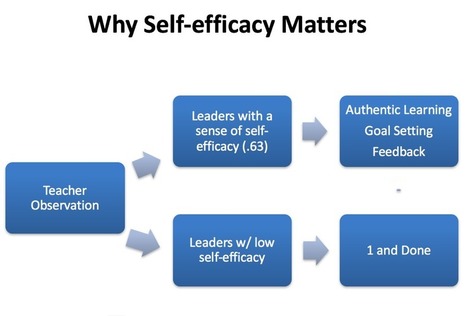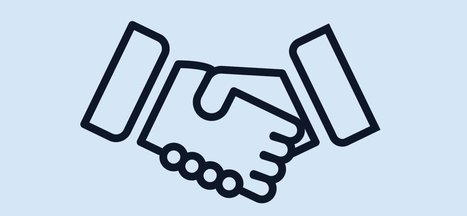 Your new post is loading...
 Your new post is loading...
What puts leaders at risk of failure is that too many of them believe they have to be experts at every single one of those responsibilities. After all, they were hired to lead? This is where we need to foster a change in mindset, because no one can meet all of the demands of leadership by themselves. And no one, needs to be an expert at everything. What leaders need is the belief that they can meet those demands by working collaboratively with their staff and school community.
Via Dennis Swender, june holley
If you’re constantly frazzled on the job, logging super-long hours with little to show for it at the end of the day, chances are good that you’re mismanaging your time. But the good news is it’s easy (enough) to reorganize your schedule and get back on a successful track, stat! “There’s a lot coming at us: mail–and [all kinds of] paper in general–emails, texts, phone calls, bosses calling for help, deadlines, projects–it doesn’t stop,” points out Felice Cohen, organizer and author of 90 Lessons for Living Large in 90 Square Feet (or More). No wonder so many of us get so behind and feel so exasperated. But it doesn’t have to stay that way. The answer isn’t to do more. “Not everyone can multitask, and most of us who do probably shouldn’t,” says Cohen. Rather, the answer is to do what you do smarter. And here’s how.
Via The Learning Factor
Companies want to be profitable and maximize their performance and impact both in the world and within their industry. With that said, accomplishing those feats starts with cultivating a culture to allow those things to happen which starts with a priority on employee well-being. Culture is important -- it affects engagement, mindset, reputation, recruitment of talent, and well being. When looking to cultivate a healthy and high performing culture, start by emphasizing these six points:
Via The Learning Factor, Mark E. Deschaine, PhD, Bobby Dillard
We might spend days, months, or even years trying to figure someone out. Is he who he says he is? Should I trust her? The wheels in our head spin as we think of all the variables and how they'll play out. And still, we keep hearing that we should just listen to our instincts. Complicated questions, simple answer. What should we do, and where did this whole idea of the gut instinct come from, anyway? Intuition isn't some magical, mysterious quality that we carry with us. It actually comes from the knowledge and past experiences that we all carry. Even if we're unable to explain why we feel the way we do, there's a logical explanation behind our gut feelings. Whenever you encounter anything new, the unconscious side of your brain is constantly making assessments. It takes in certain cues, such as a smile or parts of a story, and then matches it with something similar in our database of memories to come up with a conclusion. Meanwhile, our conscious side remains unaware of this rapid process taking place.
Via The Learning Factor
As entrepreneurs, we often work late into the night, only to roll out of bed the next morning, picking up where we left off. One day bleeds into the next, making it seem as if we're always doing, doing, doing and searching for new and novel ways to do more. The truth is, your desire to do more and get more done will lead you not toward greater productivity, but toward burnout, if you don't take time each day to check in with yourself, and set your intention for how you want your day to proceed. Abraham Lincoln is credited with saying, "If I had six hours to cut down a tree, I'd spend the first four sharpening the axe." There is no evidence to suggest that Lincoln actually said this, but the point is not lost on us. How we prepare to do the task before us determines our success.
Via The Learning Factor
No matter where you are in your career, it’s only natural to occasionally feel as though there are things you’d like to change. But it’s one thing to say you want to make a change and quite another to actually make it happen. In order to make serious steps toward reinventing yourself, you need to first commit to it and then take action to make those changes a reality. Here are twelve ways you can reinvent yourself at work and in your personal life, backed by science.
Via The Learning Factor
Packing your beach bags? Firing up a grill? Now’s the time for leaving work concerns at work and skipping off someplace where you can relax, regenerate, let loose, and just have fun. The idea of doing anything that even remotely reminds you of your job probably doesn’t seem too appealing—and that’s fine. But even so, your vacation doesn’t have to be dead time when it comes to self-improvement. Before you roll your eyes and click or swipe out, there’s good news: You can boost your skills while relaxing and de-stressing. In other words, your vacation can be a great time to improve your emotional intelligence—and still thoroughly remain in vacation mode. Since that’s one of the most important job skills on the market right now, it’s worth taking a page or two from the most emotionally intelligent vacationers’ play books.
Via The Learning Factor
Whether you are building your business, trying to land your dream job or climbing your way up the corporate ladder, it seems like everyone tells you to network. It is the key to achieving your goals. However, people rarely tell you exactly how to network effectively and build a community that will last.
Via The Learning Factor, Bobby Dillard
How you spend your night can have a huge impact on the day that follows. Do you spend your time ruminating over issues? Or maybe you stress over something that didn't quite go right during the day. There's no doubt, how you think affects how you feel. This is particularly important at night as you try to unwind and prepare for rest. This sets you up for sleep which serves many vital purposes. When I look at my clients who achieve the most during their days and are happiest, they are the ones who have a healthy routine at night. They set themselves up for success the following day by thinking and acting in a particular way.
Via The Learning Factor
The internet is chock full of daily habits that will help your routine, but what about bad habits? Because habits are so ingrained into our daily routines, we often don't notice how harmful ones sneak in and ruin our success. Try eliminating the following habits from your life and see how your success in business and in life improve:
Via The Learning Factor
There is a daily practice that just may change your life. The good news is that it's simple and easy to implement. It begins by choosing 3 words.
Via Dan Forbes
|
Of all the things you learned in school, chances are the right way to learn wasn’t one of them. To make it through academic life, most of us opt for what psychologists call “massed practice,” better known as cramming: It’s Monday and your test is Friday, so you save studying for the night before. One four-hour session can nab you a passing grade, so why not? Well, because that’s not how your brain likes to absorb information. You might remember enough to pass your exam the next day, but just a week or two later and the details will already be fuzzy, if not gone completely. Here’s how to do better.
Via The Learning Factor
What do people want out of work? More than money, more than benefits, much more than job security, a recent survey says, they want to be treated with respect. If that sounds like you, how can you increase the respect you get each day at work? It turns out that there are specific habits you can cultivate that allow you to train the people you work with to treat you respectfully each day. Here are 33 of these proven habits that can help, if you're willing to stick with them. Implement a few, take inspiration from the others, and you'll likely see dividends quickly.
Via The Learning Factor
Some people just seem to bounce back from whatever life throws at them. Whether it’s illness, loss, or tragedy, they do the tough work of picking themselves up, dusting themselves off, and carrying on—even when it seems impossible. If you’ve ever thought, “I could never do that” when looking at one of these apparent “superheroes,” don’t be so sure. It’s actually possible to build resilience to make yourself better able to bounce back from even the most difficult times. “It’s the ability to get back in the game after you’ve had some sort of failure. And indeed, we can learn to become more resilient,” says social scientist and leadership expert Frank Niles, PhD. Niles says there are a number of science-backed areas people can address to help them be more resilient. Here are some ways you can shore up your “resilience bunker” to better prepare for when tough times strike.
Via The Learning Factor
Find it hard to advocate for yourself? You’re not alone. The personality trait that psychologists call “agreeableness” describes how motivated you are to get along with other people. If you’re highly agreeable, that motivation can sometimes prevent you from sticking up for your own interests. Anytime you ask for something at work, you run the risk that you’ll be told “no”–and possibly aggravate the person you’re asking. As a result, agreeable people may be put off from asking in the first place. This can be a problem, because research suggests that agreeable people tend to make less money than disagreeable people (even accounting for the fact that disagreeable people lose their jobs more often). And in leadership roles, agreeable people may not be as good at getting their teams all the resources they need. So what can you do to be more assertive even when it just isn’t in your personality to do so? Here are a few tips.
Via The Learning Factor
Millennials are starting to take control in the workplace. There are now more than 75 million millennials in the workforce, more than baby boomers (just shy of 75 million) and Gen Xers (66 million). Now entering their late 20s and early 30s, the oldest members of the generation are starting to take more leadership positions in major organizations. Despite the fact that millennials are sporting one of the lowest rates of entrepreneurship in 25 years, 60% see themselves as entrepreneurs, and 90% recognize entrepreneurship as a mindset. Combined with their natural tendencies toward independent thought and mild to moderate anti-establishment vibes, this is making millennials a strong force of direction and leadership—and an even stronger one to come in the next several years.
Via The Learning Factor
It’s hard to get anything done with all of the push notifications pulling us into other directions. You can find something else to do or think about at any given moment. But maybe the distractions aren’t the problem. Maybe it’s your willingness to be distracted that needs to be examined. “Distractions are by-products of a problem,” says Kyle Cease, author of I Hope I Screw This Up: How Falling In Love With Your Fears Can Change the World. “Something outside of you is pulling you away from yourself or a goal. But the distraction is actually on the inside, and what’s going on outside matches what’s going on inside.” We invite distractions as a way to handle three internal struggles, says Cease.
Via The Learning Factor
A few weeks ago, after receiving a 21-page PDF report breaking down my so-called “emotional intelligence,” I did the logical thing and forwarded it to my boyfriend. He glanced at the list of categories on the second page and exclaimed—before reading my results—”Flexibility, uh oh!” The report was the result of an assessment I’d taken three weeks prior called the EQ-i 2.0, which is based on nearly 20 years of research and has been taken by some 2 million people—and sure enough, it told me I’m about as inflexible as people close to me seem to think I am. Shortly afterward I scheduled a call with its developer, Steven J. Stein, who reviewed my results and offered this suggestion: “I would start looking at how you operate—what your routines are, how you get through a day.” When I asked him for an example of a routine I might want to shake up, he said, “Like, eat a different breakfast or something.”
Via The Learning Factor
Writing a to-do list seems like a tidy little way to keep track of what you need to accomplish, but it can fall short or even derail your success. To-do lists don’t provide context about the tasks, they don’t give you a timeline, and they’re easy to ignore. What’s more, to-do list prioritizing systems can be complicated and hard to navigate. So should you ditch your to-do list completely? Absolutely not, says Paula Rizzo, author of Listful Thinking: Using Lists to be More Productive, Highly Successful and Less Stressed. "Lists can change your life if you use them correctly," says Rizzo, founder of ListProducer.com, a website that offers tips and courses for making lists. "It seems so simple to write a list but there's actually a right way and wrong way to do it if you want to be successful. Oftentimes our bad list-making habits are holding us back."
Via The Learning Factor
Of all our available resources, everyone has the same number of hours in a day. Some, however, happen to get more done. Are they faster or smarter? Do they have more help? Perhaps. But they’ve also learned tricks that can help them stretch time and eliminate the unimportant.
Here are six things super-productive people do every day to maximize their results and success.
Via The Learning Factor
The future of work is all about innovation and agility. We have to be prepared for ever-changing circumstances, and that means being open to learning new things. Learning is no longer something we just do in schools. We can't rely on just the skillset we knew when we entered the workforce--that will guarantee career stagnation. So I decided to sit down with Dr. Josh Davis, the Director of Research and Lead Professor for the NeuroLeadership Institute, an organization devoted to using science to advance leadership potential. NLI has recently been exploring how to make ideas stick. Through their research, they created a model outlining four key conditions for effective learning: Attention, Generation, Emotion and Spacing (AGES).
Via The Learning Factor
|



 Your new post is loading...
Your new post is loading...








































Anyone that has just been appointed a manager or on the path of management will be scrambling around like crazy trying to learn what it takes to be an effective manager. You'll enjoy this article - collaboration is one of my own personal favorites and I believe it unites teams, gives them a common purpose and allows employees to be heard and trusted. Go On Collaborate Today for better results...